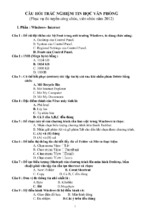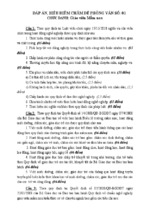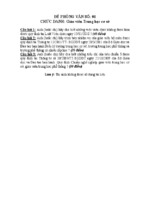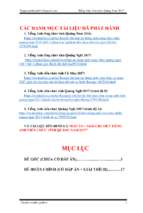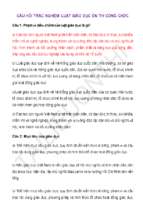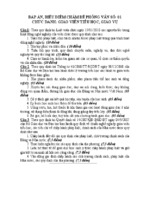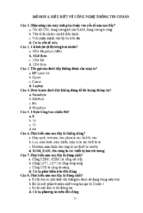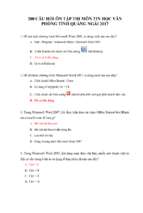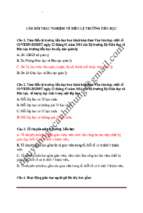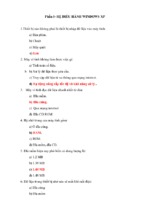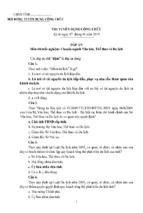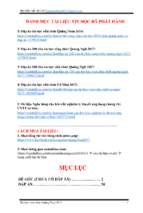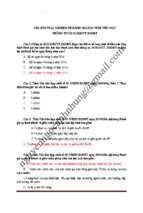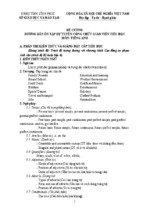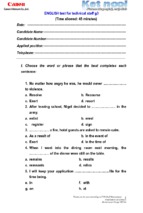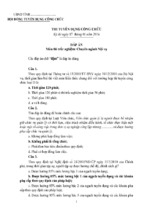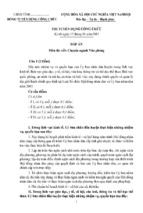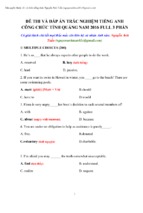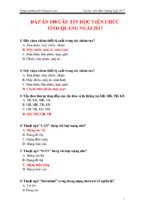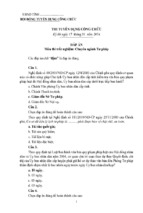ĐỀ THI TỐT NGHIỆP MÔN KIẾN THỨC CHUYÊN MÔN CHUYÊN NGÀNH SƯ
PHẠM ANH NĂM 2013
ĐỀ SỐ 1
MÔN THI: KIẾN THỨC CHUYÊN MÔN
NGÀNH ĐÀO TẠO: SƯ PHẠM TIẾNG ANH
MÔN: KIẾN THỨC CHUYÊN MÔN
(Thời gian thi: 150 phút)
(Đề thi gồm: 10 trang)
A. PHONETICS (10pts)
I. Find the word with the different stress in each sentence by circling the letter A, B, C
or D.
1. A. direction
B. community
C. garbage
D. utility
2. A. product
B. convert
C. efficient
D. dispose
3. A. biological
B. expedition
C. synthetic
D. scientific
4. A. experiment
B. giant
C. windmill
D. software
5. A. geometric
B. supply
C. potential
D. pollution
II. Choose the word in each group that has the underlined part pronounced differently
from the rest by circling the letter A, B, C or D.
6. A. imagined
B. released
C. rained
D. followed
7. A. smells
B. cuts
C. opens
D. plays
8. A. baggage
B. village
C. manage
D. stage
9. A. moustache
B. loud
C. found
D. brown
10. A. chair
B. cheap
C. chorus
D. child
B. VOCABULARY (10pts)
Choose the correct form of the words for each sentence below by circling the letter A, B,
C or D.
11. Learners are (ACT) ____________ as opposed to passive recipients of knowledge.
A. acting
B. acted
C. action
D. active
12. The (EMPHASIZE) ___________ in language teaching and learning is on the
communicative nature of language.
A. emphatic
B. emphasizing
C. emphasis
D. emphatically
13. Graduates from universities and junior colleges should be sent to remote rural and
mountainous areas to teach ethnic minorities and battle (LITERATE) ____________.
A. illiteracy
B. literacy
C. illiterate
D. literature
14. Women have (OCCUPY) __________ a subservient position in society throughout
“civilized” human history.
A. occupation
B. occupational
C. occupied
D. occupying
15. A paragraph is a (LINGUIST) __________ expression of a logical, pragmatic and
aesthetic arrangement of thought.
A. linguistic
B. linguistics
C. linguistically
D. lingual
16. One of the most prominent functions of the (EDIT) __________ is to exert influence
upon the reader by giving an interpretation of certain facts.
A. edition
B. editorial
C. editor
D. editorship
1
17. The designers brought to the show their own collections with unique style, which were
(IMPRESS) __________ with a renovated thinking.
A. impression
B. impressing
C. unimpressive
D. impressive
18. The Vietnamese are very (SENSE) _________ in relating to people body language.
A. sensitive
B. sensational
C. sensible
D. senseless
19. American (ROMANCE) _________ emphasized emotion in literature, interest in the
past and in the national scene.
A. romantic
B. romanticism
C. romantically
D. romanticist
20. (ADMINISTRATE) ___________ reform is a huge task that must be carried out
long-term.
A. Administrating
B. Administration
C. Administrative
D.
Administrator
C. GRAMMAR (20pts)
21. Identify the part of speech of the underlined word in each of the following sentence.
Hey! That was my seat
A. Conjunction
B. Interjection
C. Adverb
D. Preposition
22. Identify the kind of the underlined noun in each of the following sentence.
Will the students find the answers themselves?
A. Concrete noun
B. Abstract noun
C. Collective noun D. Material noun
23. Identify the part of speech of the underlined word in each of the following sentence.
Everyone in the room cheered when the announcement was made
A. Noun
B. Pronoun
C. Adverb
D. Preposition
24. Identify the form of underlined compound noun in the following sentence.
Horse-riding is my hobby.
A. Noun + Noun
B. Noun + Gerund
C. Gerund + Noun
D. Present participle + Noun
25. Identify the kind of underlined verb in the following sentence.
Do you understand the question?
A. Intensive verb
B. Monotransitive verb
C. Ditransitive verb
D. Complex transitive verb
26. Identify the part of speech of the underlined word in each of the following sentence.
He drove some of them mad.
A. Adverb
B. Adjective
C. Noun
D. Interjection
27. Identify the function of underlined noun in the following sentence.
He sent a letter to Mary.
A. Indirect object
B. Direct object
C. Complement
D. Subject
28. Identify the kind of underlined adjective in the following sentence.
That book is interesting
A. Possessive adjective
B. Interrogative adjective
C. Demonstrative adjective
D. Quantitative adjective
29. Identify the kind of underlined adverb in the following sentence.
She took it down carefully.
A. Adverb of manner
B. Adverb of degree
C. Adverb of frequency
D. Adverb of place
30. Identify the kind of underlined pronoun in the following sentence.
2
We help each other a lot.
A. Indefinite pronoun
B. Impersonal pronoun
C. Reciprocal pronoun
D. Demonstrative pronoun
31. Identify the type of the following sentence.
The boy who carried a blue parcel crossed the street.
A. Simple sentence
B. Compound sentence
C. Complex sentence
D. Compound-complex sentence
32. Analyze the following sentence.
Could you call me a porter?
A. S V O O
B. S V O
C. S V O C
D. S V O A
33. Identify the function of underlined subordinate clause in the following sentence.
That you could do it I always knew.
A. Subject
B. Object
C. Complement
D. Adjunct
34. Choose the best answer to complete the sentence.
Along with the race, there is a giant street party ______.
A. some of which takes place before the race
B. which some of it takes place before the race
C. some of its take place before the race
D. whose takes place before the race
35. Identify the kind of underlined clause in the following sentence.
What you do now is the most important.
A. Adjective clause
B. Adverbial clause
C. Noun clause
D. Main clause
36. Identify the function of underlined noun clause in the following sentence.
The truth is that the moving company lost all your furniture.
A. Subject
B. Object
C. Subject Complement
D. Object Complement
37. Analyze the following sentence.
Finding peace and quiet has become very difficult.
A. S V O
B. S V C
C. S V A
D. S V
38. Identify the kind of underlined adverbial clause in the following sentence.
Since I got my new glasses, I can see what I am reading.
A. Adverb clause of time
B. Adverb clause of circumstance
C. Adverb clause of result
D. Adverb clause of condition
39. Combine the following pair of simple sentence so as to form a compound sentence.
The city was not abandoned after the fires of 1666. It was not abandoned after the fires of
1940.
A. The city was abandoned either after the fires or after the fires of 1940.
B. The city was abandoned neither after the fires nor after the fires of 1940
C. The city was abandoned both after the fires and after the fires of 1940
D. The city was abandoned not only after the fires but also after the fires of 1940
40. Identify the function of underlined subordinate clause in the following sentence.
3
What he saw both surprised and frightened him.
A. Subject
B. Object
C. Complement
D. Adjunct
D. READING (30pts)
Read the following passage and choose the best answer A, B, C or D.
Questions 41-50
How men first learnt to (41)______ words is unknown; in other words, the origin of
language is a (42)______. All we really know is that men, unlike animals, (43)______
invented certain sounds to express thoughts and feelings, actions and things so that they
could communicate with each other; and that later they agreed (44)______ certain signs,
called letters, which could be combined to represent those sounds, and which could be
written down. These sounds, (45)______ spoken or written in letters, are called words.
Great writers are those who not only have great thoughts but also express these
thoughts in words that (46)______ powerfully to our minds and emotions. This charming
and telling use of words is what we call literary (47)______. Above all, the real poet is a
master of words. He can (48)______ his meaning in words which sing like music, and
which by their position and association can (49)______ men to tears. We should,
therefore, learn to choose our words carefully, (50)______ they will make our speech silly
and vulgar.
41. A. invent
B. create
C. make
D. discover
42. A. story
B. secret
C. mystery
D. legend
43. A. whatever
B. however
C. somewhat
D. somehow
44. A. at
B. upon
C. with
D. to
45. A. if
B. however
C. whether
D. though
46. A. interest
B. appeal
C. attract
D. lure
47. A. prose
B. work
C. form
D. style
48. A. carry
B. convey
C. transfer
D. transmit
49. A. take
B. send
C. break
D. move
50. A. or
B. so
C. although
D. because
Questions 51-60
Reading to oneself is a modern activity which was almost unknown to the scholars
of the classical and medieval worlds, while during the fifteenth century the term “reading”
undoubtedly meant reading aloud. Only during the nineteenth century did silent reading
become commonplace.
One should be wary, however, of assuming that silent reading came about simply
because reading aloud was a distraction to others. Examinations of factors related to the
historical development of silent reading have revealed that it became the usual mode of
reading for most adults mainly because the tasks themselves changed in character.
The last century saw a steady gradual increase in literacy and thus in the number of
readers. As the number of readers increased, the number of potential listeners declined and
thus there was some reduction in the need to read aloud. As reading for the benefit of
listeners grew less common, so came the flourishing of reading as a private activity in such
public places as libraries, railway carriages and offices, where reading aloud would cause
distraction to other readers.
4
Towards the end of the century, there was still considerable argument over whether
books should be used for information or treated respectfully and over whether the reading
of materials such as newspapers was in some way mentally weakening. Indeed, this
argument remains with us still in education. However, whatever its virtues, the old shared
literacy culture had gone and was replaced by the printed mass media on the one
hand and by books and periodicals for a specialised readership on the other.
By the end of the twentieth century, students were being recommended to adopt
attitudes to books and to use reading skills which were inappropriate, if not impossible, for
the oral reader. The social, cultural and technological changes in the century had greatly
altered what the term “reading” implied.
51. Reading aloud was more common in the medieval world because ______.
A. people relied on reading for entertainment
B. silent reading had not been discovered
C. there were few places available for private reading
D. few people could read to themselves
52. The word “commonplace” in the first paragraph mostly means “______”.
A. for everybody’s use
B. most preferable
C. attracting attention
D. widely used
53. The development of silent reading during the last century indicated ______.
A. an increase in the average age of readers B. an increase in the number of books
C. a change in the nature of reading
D. a change in the status of literate people
54. Silent reading, especially in public places, flourished mainly because of ______.
A. the decreasing need to read aloud
B. the development of libraries
C. the increase in literacy
D. the decreasing number of listeners
55. It can be inferred that the emergence of the mass media and specialised reading
materials was an indication of ______.
A. a decline of standards of literacy
B. a change in the readers’ interest
C. an alteration in educationalists’ attitudes
D. an improvement of printing techniques
56. The phrase “a specialised readership” in paragraph 4 mostly means “______”.
A. a requirement for readers in a particular area of knowledge
B. a limited number of readers in a particular area of knowledge
C. a reading volume for particular professionals
D. a status for readers specialised in mass media
57. The phrase “oral reader” in the last paragraph mostly means “a person who ______”.
A. is good at public speaking
B. practises reading to an audience
C. takes part in an audition
D. is interested in spoken language
58. All of the following might be the factors that affected the continuation of the old
shared literacy culture EXCEPT ______.
A. the inappropriate reading skills
B. the specialised readership
C. the diversity of reading materials
D. the printed mass media
59. Which of the following statements is NOT TRUE according to the passage?
A. Reading aloud was more common in the past than it is today.
B. Not all printed mass media was appropriate for reading aloud.
C. The decline of reading aloud was wholly due to its distracting effect.
5
D. The change in reading habits was partly due to the social, cultural and technological
changes.
60. The writer of this passage is attempting to ______.
A. explain how reading habits have developed
B. change people’s attitudes to reading
C. show how reading methods have improved
D. encourage the growth of reading
Questions 61-70
The Sun today is a yellow dwarf star. It is fueled by thermonuclear reactions near
its center that convert hydrogen to helium. The Sun has existed in its present state for
about four billion six hundred million years and is thousands of times larger than the
Earth.
By studying other stars, astronomers can predict what the rest of the Sun’s life will
be like. About five billion years from now, the core of the Sun will shrink and become
hotter. The surface temperature will fall. The higher temperature of the center will increase
the rate of thermonuclear reactions. The outer regions of the Sun will expand
approximately 35 million miles, about the distance to Mercury, which is the closest planet
to the Sun. The Sun will then be a red giant star. Temperatures on the Earth will become
too high for life to exist.
Once the Sun has used up its thermonuclear energy as a red giant, it will begin to
shrink. After it shrinks to the size of the Earth, it will become a white dwarf star. The Sun
may throw off huge amounts of gases in violent eruptions called nova explosions as it
changes from a red giant to a white dwarf. After billions of years as a white dwarf, the
Sun will have used up all its fuel and will have lost its heat. Such a star is called a black
dwarf.
After the Sun has become a black dwarf, the Earth will be dark and cold. If
any atmosphere remains there, it will have frozen over the Earth’s surface.
61. It can be inferred from the passage that the Sun ______.
A. is approximately halfway through its life as a yellow dwarf
B. will continue to be a yellow dwarf for another 10 billion years
C. has been in existence for 10 billion years
D. is rapidly changing in size and brightness
62. What will probably be the first stage of change for the Sun to become a red giant?
A. Its surface will become hotter and shrink.
B. It will throw off huge amounts of gases.
C. Its central part will grow smaller and hotter.
D. Its core will cool off and use less fuel.
63. When the Sun becomes a red giant, what will the atmosphere be like on the Earth?
A. It will be enveloped in the expanding surface of the sun.
B. It will become too hot for life to exist.
C. It will be almost destroyed by nova explosions.
D. It will freeze and become solid.
64. When the Sun has used up its energy as a red giant, it will ______.
A. get frozen
B. cease to exist
C. stop to expand
D. become smaller
65. Large amounts of gases may be released from the Sun at the end of its life as a
______.
A. black dwarf
B. white dwarf
C. red giant
D. yellow dwarf
6
66. As a white dwarf, the Sun will be ______.
A. the same size as the planet Mercury
B. around 35 million miles in diameter
C. a cool and habitable planet
D. thousands of times smaller than it is today
67. The Sun will become a black dwarf when ______.
A. the Sun moves nearer to the Earth
B. it has used up all its fuel as a white dwarf
C. the core of the Sun becomes hotter
D. the outer regions of the Sun expand
68. The word “there” in the last sentence of paragraph 4 refers to ______.
A. the planet Mercury
B. the core of a black dwarf
C. our own planet
D. the outer surface of the Sun
69. This passage is intended to ______.
A. describe the changes that the Sun will go through
B. present a theory about red giant stars
C. alert people to the dangers posed by the Sun
D. discuss conditions on the Earth in the far future
70. The passage has probably been taken from ______.
A. a scientific journal
B. a news report
C. a work of science fiction
D. a scientific chronicle
E. WRITING (30pts)
I. Choose the correct sentence which has the same meaning as the given one by circling
the letter A, B, C or D.
71. Nothing but the whole story would satisfy Tim.
A. Tim wouldn’t be satisfied with any thing.
B. Tim wanted to know just the end of the story.
C. On the whole, Tim was satisfied with the story.
D. Tim insisted on being told the complete story.
72. He survived the operation thanks to skilful surgery.
A. He survived because he was skilful surgeon
B. Without skilful surgery, he wouldn’t have survived the operation.
C. There was no skilful surgery, so he died.
D. In spite of the surgery, he didn’t survive.
73. I've yet to meet a more exasperating person than my brother-in-law.
A. My brother-in -law is the more exasperating person I've ever met.
B. My brother-in-law is more exasperating than I am.
C. I've never met a more exasperating than my brother-in-law.
D. all are correct
74. With six children on her hands, she's extremely busy.
A. She's very busy because she always carries her six children.
B. Her six children's hands always make her busy.
C. With six children to look after, she's extremely busy.
D. She's too busy to look after her six children.
75. Were it not for the money, this job wouldn't be worthwhile.
A. This job is not rewarding at all.
B. This job offers a poor salary.
C. Although the salary is poor, the job is worthwhile.
D. The only thing that makes this job worthwhile is the money.
7
76. At no time did the two sides look likely to reach an agreement.
A. The two sides had no time to reach an agreement.
B. The two sides never looked likely to reach an agreement.
C. If the two sides had had time, they would have reached an agreement.
D. The two sides never look like each other.
77. It won't be long before her husband comes back.
A. Her husband will be returning quite soon.
B. Her husband will come back later than planned.
C. There's likelihood that her husband won't return soon.
D. Possibly, her husband won't come back as soon as he wants.
78. Impressed as we were by the new cinema, we found it rather expensive.
A. We were very impressed by the new cinema, but found it rather expensive.
B. We were not impressed by the new cinema at all because it looked rather expensive.
C. We weren't as much impressed by the new cinema's look as its cost.
D. The new cinema was more expensive than we expected.
79. Hardly are appeals allowed against the council's decisions.
A. The council always allows appeals against its decisions.
B. It's too hard for the council to allow appeals against its decisions.
C. Allowing appeals against its decisions is not good.
D. The council rarely allows appeals against its decisions.
80. There was not much resemblance between the final version and the final draft.
A. The final version is very similar to the initial draft.
B. The final version is quite different from the final draft.
C. The final version and the initial draft resemble in many ways.
D. The initial draft is exactly the same as the final version.
81. I travel by bus as a last resort.
A. I only travel by bus when there're no other alternatives.
B. I always travel by bus.
C. I resort to bus when I am the last to come.
D. Travelling by bus is my favorite.
82. The film didn't come up to my expectations.
A. The film was as good as I expected.
B. I expected the film to be longer.
C. I expected the film to end more abruptly.
D. The film fell short of my expectations.
83. It doesn't matter to them which film they go to.
A. No matter what film are shown, they never go.
B. They have a good taste for films.
C. Which film they go to matters more than the cost.
D. They don't mind which film they go to.
84. We could just discern the buildings through the fog.
A. We could hardly see the buildings through the fog.
B. We could imagine the buildings through the fog
C. We could just make out the buildings through the fog.
D. The fog prevented us from seeing the buildings.
8
85. The onset of the disease is shown by a feeling of faintness.
A. A feeling of faintness signals the final stage of the disease
B. One feels faint if the disease is over.
C. The first sign of the disease is a feeling of faintness.
D. Faintness causes the disease.
II. From the given clues, choose the most appropriate completion of sentence by
circling the letter A, B, C or D.
86. Papers/ deliver/ door/ everyday.
A. Papers are delivered at the door everyday.
B. Papers is delivered at the door everyday.
C. The papers are delivered to the door everyday.
D. Papers is deliver to the door everyday.
87. Every/ week/ this/ television show/ watch/ thousands/ people.
A. Every week this television show is watched by thousands of people.
B. Every week this television show watches thousands of people.
C. Every week this television show is watch by thousands of people.
D. Every week this television show watched by thousands of people.
88. Lan /always/ give/ nice/ present/ her/ birthday/ parents.
A. Lan gives nice presents to her on the birthday of her parents.
B. Lan is always given nice presents on birthday of her parents.
C. Lan is always given nice presents on her birthday by her parents.
D. Lan always gives nice presents on her birthday by her parents.
89. The/ books/ have to/ give/ back/ They/ not/ allow/ take/ home.
A. The books have to be given back. They are not allow to take home.
B. The books have to be given back. They are not allowed to be taken home.
C. The books have to be give back. They are not allowed to be taken home.
D. The books have to be given back. They do not allowed to be taken home.
90. Most/ rice/ grow/ wet/ soil/ but/ upland/ rice/ grow/ dry/ soil.
A. Most rice is grown in wet soil but upland rice is grown in dry soil.
B. Most of rice is grow in wet soil but upland rice grow in dry soil.
C. Most rice is grown by wet soil but upland rice is grown by dry soil.
D. Most rice grows in wet soil but upland rice grows in dry soil.
91. You/ think/ you/ still/ do/ same/ job/ 10 years’ time?
A. Do you think you did the same job in 10 years’ time?
B. Do you think you will still be doing the same job in 10 years’ time?
C. Do you think you still will be doing a same job in 10 years’ time?
D. Do you think you will be still doing the same job by 10 years’ time?
92. They/ insist/ see/ manager.
A. They insisted in their seeing the manager.
B. They insisted on their seeing the manager.
C. They insisted about their seeing the manager.
D. They insisted for their seeing the manager.
93. I/ rather/ you/ deliver/ sofa/ Sunday.
A. I’d rather you delivering the sofa Sunday.
B. I’d rather you to deliver the sofa on Sunday.
9
C. I’d rather you deliver the sofa on Sunday.
D. I’d rather you delivered the sofa on Sunday.
94. Galileo/ regard/ father/ modern astronomy.
A. Galileo is regarded as the father of modern astronomy.
B. Galileo is regarded as the father of the modern astronomy.
C. Galileo is regarded about the father of modern astronomy.
D. Galileo is regarded of the father of modern astronomy.
95. Anna/ plead/ boyfriend/ drive/ fast.
A. Anna pleaded her boy friend not to driving so fast.
B. Anna pleaded her boy friend not drive so fast.
C. Anna pleaded her boy friend not to drive so fast.
D. Anna pleaded her boy friend not driving so fast.
96. opinion/ election/ fair.
A. My opinion was fair about the election.
B. In my opinion, I think the election was fair.
C. According to my opinion, the election was fair.
D. In my opinion, the election was fair.
97. you/ really/ be/ able/ dress/ yourself/ age.
A. You must really be able of dressing yourself in your age.
B. You should really be able to dress yourself at your age!
C. You have really been able of dressing yourself by your age.
D. You are really able of dressing yourself this age!
98. provide/ your handwriting/ legible/ test scorer/ accept/ your answer.
A. Providing your handwriting is legible, the test scorer does not accept your answer.
B. Provided for your legible handwriting, the test scorer has to accept your answer.
C. Provided that your handwriting is legible, your answer will be accepted by any test
scorer.
D. Providing with your legible handwriting, every test scorer must accept your answer.
99. imagine/ who/ happen/ run into/ yesterday/just.
A. You imagine just who happened to run into us yesterday!
B. Have you just imagined who happened to run into me yesterday?
C. Could you imagine who just happened to run into us yesterday?
D. Just imagine who I happened to run into yesterday!
100. Jack/ recover/ quickly/ his serious illness.
A. Jack was recovered very quickly from his serious illness.
B. Jack has recovered quite quickly from his serious illness.
C. Jack will recover quite quickly after his serious illness.
D. Jack recovered more quickly over his serious illness.
---------- THE END-----------
10
ĐÁP ÁN ĐỀ THI SỐ 1
NGÀNH ĐÀO TẠO: SƯ PHẠM TIẾNG ANH CĐSP
MÔN: KIẾN THỨC CHUYÊN MÔN
( Tổng: 10 điểm/ 100 câu = 0,1 điểm/ 01 câu)
A. PHONETICS
1. C
2. A
3. C
4. A
5. A
6. B
7. A
8. D
9. A
10. C
B. VOCABULARY
11. D
12. C
13. A
14. C
15. A
16. B
17. D
18. A
19. B
74. C20. C
21. B47. D
C. GRAMMAR
22. A
23. B
24. B
25. B
26. B
27. B
28. C
29. A
30. C
31. C
32. A
33. B
34. A
35. C
36. C
37. B
38. A
39. B
40. A
D. READING
41. A
42. C
43. D
44. B
45. C
46. B
48. B
53. C
54. C
55. B
56. B
57. B
58. A
59. C
60. A
61. A
62. C
63. B
64. D
65. C
66. D
67. B
68. C
69. A
70. A
E. WRITING
71. D
72. B
73. D
75. D
49. D
50. A
51. D
52. D
76. B
77. A
78. A
79. D
11
80. B
81. A
82. D
83. D
84. C
85. C
86. A
87. A
88. C
89. B
90. A
91. B
92. B
93. C
94. A
95. C
96. D
97. B
98. C
99. D
100. B
ĐỀ SỐ 2
ĐỀ THI TỐT NGHIỆP NĂM 2013
MÔN THI: KIẾN THỨC CHUYÊN MÔN
NGÀNH ĐÀO TẠO: SƯ PHẠM TIẾNG ANH
MÔN: KIẾN THỨC CHUYÊN MÔN
(Thời gian thi: 150 phút)
(Đề thi gồm: 10 trang)
A. PHONETICS
I. Find the word with the different stress in each sentence by circling the letter A, B, C
or D.
1. A. destroy
B. disappear
C. development
D. independent
2. A. accelerate
B. digestive
C. disorder
D. infantry
3. A. convenient
B. previous
C. management
D. purchase
4. A. deliberate
B. dramatist
C. discovery
D. improvement
5. A. redundancy
B. comparison
C. maintenance
D. capacity
II. Choose the word in each group that has the underlined part pronounced differently
from the rest by circling the letter A, B, C or D.
6. A. frustrate
B. rubbish
C. punctual
D. furious
7. A. ache
B. chaos
C. charity
D. archaecology
8. A. nourish
B. flourish
C. southern
D. courageous
9. A. chooses
B. houses
C. rises
D. horses
10. A. killed
B. cured
C. crashed
D. waived
B. VOCABULARY (10pts)
Choose the correct form of the words for each sentence below by circling the letter A, B,
C or D.
11. Learners can (PRODUCTION) ___________ materials and provide realia for the
classroom.
A. product
B. produce
C. producing
D. productive
12. Both self-correction and peer-correction encourage the active role of the student and
promote (COOPERATE) __________ learning in the classroom.
A. cooperative
B. cooperated
C. cooperation
D. cooperatively
13. Many educators agree the entire national education system could use a facelift and a
(COMPREHEND) _________ improvement of all three tiers.
A. comprehensible
B. comprehensive
C. comprehending
D. comprehension
14. Women’s participation in socially productive work leads to the healthy development of
their (PERSON) _________.
A. personality
B. personal
C. personnel
D. impersonality
15. A (CONCLUDE) ___________ sentence gives a final comment on a topic and leaves
the reader with the most important ideas to think about.
A. concluded
B. conclusive
C. concluding
D. conclusion
12
16. The notional (DEFINE) ___________ of a sentence as expressing a complete thought
is too vague.
A. definition
B. defined
C. defining
D. definable
17. Social relationships have become healthier, lifestyle more (CIVILIZE) __________
and fine traditional values preserved and developed.
A. civility
B. civilization
C. civilizing
D. civilized
18. Colours and animals can have (SYMBOL) ________ meanings which are worth
remembering during the selection of gifts.
A. symbolized
B. symbolizing
C. symbolism
D. symbolic
19. The great writer believed in man and was (OPTIMIST) __________ full of hope for
the future.
A. optimistic
B. optimism
C. optimistically
D. optimized
20. Legal documents were initially the main instruments used in state and social
(GOVERN) __________.
A. governing
B. governance
C. government
D. governmental
C. GRAMMAR (20pts)
21. Identify the part of speech of the underlined word in each of the following sentence.
They wondered if there truly was honour among thieves.
A. conjunction
B. interjection
C. adverb
D. preposition
22. Identify the kind of the underlined noun in each of the following sentence.
The troops scattered throughout the woods
A. concrete noun
B. abstract noun
C. collective noun D. material noun
23. Identify the part of speech of the underlined word in each of the following sentence.
Hurray! Our team has finally scored a goal.
A. conjunction
B. interjection
C. adverb
D. preposition
24. Identify the form of underlined compound noun in the following sentence.
His work is coming to a standstill.
A. Verb + Adverb
B. Adverb + Verb
C. Verb + Noun
D. Noun + Adverb
25. Identify the kind of underlined verb in the following sentence.
English and German are separate languages.
A. Intensive verb
B. Monotransitive verb
C. Ditransitive verb
D. Complex transitive verb
26. Identify the part of speech of the underlined word in each of the following sentence.
The heat turned the milk sour.
A. Adverb
B. Adjective
C. Noun
D. Interjection
27. Identify the function of underlined noun in the following sentence.
She gave the children some apples.
A. Indirect object
B. Direct object
C. Complement
D. Subject
28. Identify the kind of underlined adjective in the following sentence.
That is a good book.
A. Possessive adjective
B. Qualitative adjective
C. Demonstrative adjective
D. Quantitative adjective
29. Identify the kind of underlined adverb in the following sentence.
It rained heavily after I got home.
13
A. Adverb of manner
B. Adverb of degree
C. Adverb of frequency
D. Adverb of place
30. Identify the kind of underlined pronoun in the following sentence.
They didn’t say anything to one another.
A. Indefinite pronoun
B. Impersonal pronoun
C. Reciprocal pronoun
D. Demonstrative pronoun
31. Identify the type of the following sentence.
No one may leave the area until the police have checked all of the buildings.
A. Simple sentence
B. Compound sentence
C. Complex sentence
D. Compound-complex sentence
32. Analyze the following sentence
We are in a bit of mess.
A. S V O
B. S V A
C. S V C
D. S V O A
33. Identify the function of underlined subordinate clause in the following sentence.
If you can do it, I’ll give you ten dollars.
A. Subject
B. Object
C. Complement
D. Adjunct
34. Choose the best answer to complete the sentence.
The runners __________ gather at the starting line near the Ferry Building at 8:00 a.m.
A. theirs registrations have been received
B. who their registrations have been received
C. whose registrations have been received
D. whose their registrations have been received
35. Identify the kind of underlined clause in the following sentence.
Do you know the girl who is talking to Tom?
A. Adjective clause
B. Adverbial clause
C. Noun clause
D. Main clause
36. Identify the function of underlined noun clause in the following sentence.
Do you know when the train should arrive?
A. Direct Object
B. Indirect Object
C. Subject Complement
D. Object Complement
37. Analyze the following sentence.
I remember the reasonableness of my father’s argument..
A. S V O
B. S V C
C. S V A
D. S V
38. Identify the kind of underlined adverbial clause in the following sentence.
The charges will be dropped provided that all parties agree to the settlement.
A. Adverb clause of time
B. Adverb clause of circumstance
C. Adverb clause of result
D. Adverb clause of condition
39. Combine the following pair of simple sentence so as to form a compound sentence.
George shouted a friendly greeting to me. Then he came over and shook me warmly by the
hand.
A. George not only shouted a friendly greeting to me but he also came over and shook me
warmly by the hand.
14
B. George both shouted a friendly greeting to me and came over and shook me warmly by
the hand.
C. George either shouted a friendly greeting to me or came over and shook me warmly by
the hand.
D. George not only shouted a friendly greeting to me but he came over and shook me
warmly by the hand.
40. Identify the function of underlined subordinate clause in the following sentence.
Since I was 10, I have learnt French.
A. Subject
B. Object
C. Complement
D. Adjunct
D. READING (30pts)
Read the following passage and choose the best answer A, B, C or D.
Questions 41-50
The wind controls our planet's weather and climate. But how much do we
understand about this complex force (41)______ can kill and spread fear?
On the night of October 15, 1987, the south of England was (42)_____ by strong
winds. Gusts of over 130 km/h (43)______ through the region. Nineteen people were
killed, £1.5-billion worth of damage was (44) ______ and 19 million trees were blown
down in just a few hours.
Although people thought of this (45)_____ a hurricane, the winds of 1987 were only
a (46)______ 7 storm. They remain far better known than the much more serious storms of
January 25, 1990, (47)______ most of Britain was hit by daytime winds of up to 173
km/h. On this occasion, 47 people were killed, even though, (48)______ in 1987, the
weather forecasters issued accurate warnings.
Extreme weather events such as these are dramatic (49)______ of the power of the
wind. It is one part of the weather that people generally do not give a second (50)______
to, but across the world the wind plays a crucial role in people's lives.
41. A. what
B. which
C. when
D. where
42. A. attacked
B. besieged
C. struck
D. beaten
43. A. ran
B. blew
C. flew
D. spread
44. A. paid
B. created
C. resulted
D. caused
45. A. like
B. unlike
C. same as
D. as
46. A. strength
B. length
C. power
D. force
47. A. until
B. why
C. when
D. while
48. A. when
B. like
C. unlike
D. such as
49. A. recalls
B. remains
C. memories
D. reminders
50. A. help
B. think
C. care
D. thought
Questions 51-60
Traditionally in America, helping the poor was a matter for private charities or local
governments. Arriving immigrants depended mainly on predecessors from their homeland
to help them start a new life. In the late 19th and early 20th centuries, several European
nations instituted public-welfare programs. But such a movement was slow to take hold in
the United States because the rapid pace of industrialization and the ready availability of
farmland seemed to confirm the belief that anyone who was willing to work could find a
job.
15
Most of the programs started during the Depression era were temporary relief
measures, but one of the programs - Social Security - has become an American institution.
Paid for by deductions from the paychecks of working people, Social
Security ensures that retired persons receive a modest monthly income and also provides
unemployment insurance, disability insurance, and other assistance to those who need it.
Social Security payments to retired persons can start at age 62, but many wait until age 65,
when the payments are slightly higher. Recently, there has been concern that the Social
Security fund may not have enough money to fulfill its obligations in the 21st century,
when the population of elderly Americans is expected to increase dramatically. Policy
makers have proposed various ways to make up the anticipated deficit, but a long-term
solution is still being debated.
In the years since Roosevelt, other American presidents have established assistance
programs. These include Medicaid and Medicare; food stamps, certificates that people can
use to purchase food; and public housing which is built at federal expense and made
available to persons on low incomes.
Needy Americans can also turn to sources other than the government for help. A
broad spectrum of private charities and voluntary organizations is available. Volunteerism
is on the rise in the United States, especially among retired persons. It is estimated that
almost 50 percent of Americans over age 18 do volunteer work, and nearly 75 percent of
U.S. households contribute money to charity.
51. New immigrants to the U.S. could seek help from ______.
A. the people who came earlier
B. the US government agencies
C. only charity organizations
D. volunteer organizations
52. It took welfare programs a long time to gain a foothold in the U.S. due to the fast
growth of______.
A. industrialization
B. modernization
C. urbanization
D.
population
53. The word “instituted” in the first paragraph mostly means ______.
A. “executed”
B. “studied”
C. “introduced”
D. “enforced”
54. The Social Security program has become possible thanks to ______.
A. deductions from wages
B. people’s willingness to work
C. donations from companies
D. enforcement laws
55. Most of the public assistance programs ______ after the severe economic crisis.
A. were introduced into institutions
B. did not become institutionalized
C. functioned fruitfully in institutions
D. did not work in institutions
56. That Social Security payments will be a burden comes from the concern that ______.
A. elderly people ask for more money
B. the program discourages working people
C. the number of elderly people is growing
D. younger people do not want to work
57. Persons on low incomes can access public housing through ______.
A. low rents
B. state spending
C. donations
D. federal expenditure
58. Americans on low incomes can seek help from ______.
A. federal government
B. government agencies
C. state governments
D. non-government agencies
59. Public assistance has become more and more popular due to the ______.
A. young people’s voluntarism only
B. volunteer organizations
16
C. people’s growing commitment to charity D. innovations in the tax system
60. The passage mainly discusses ______.
A. public assistance in America
B. immigration into America
C. funding agencies in America
D. ways of fund-raising in America
Questions 61-70
Millions of people are using cellphones today. In many places, it is actually
considered unusual not to use one. In many countries, cellphones are very popular with
young people. They find that the phones are more than a means of communication having a mobile phone shows that they are cool and connected.
The explosion in mobile phone use around the world has made some health
professionals worried. Some doctors are concerned that in the future many people may
suffer health problems from the use of mobile phones. In England, there has been a serious
debate about this issue. Mobile phone companies are worried about the negative publicity
of such ideas. They say that there is no proof that mobile phones are bad for your health.
On the other hand, medical studies have shown changes in the brain cells of some
people who use mobile phones. Signs of change in the tissues of the brain and head can be
detected with modern scanning equipment. In one case, a traveling salesman had to retire
at young age because of serious memory loss. He couldn't remember even simple tasks.
He would often forget the name of his own son. This man used to talk on his mobile phone
for about six hours a day, every day of his working week, for a couple of years. His family
doctor blamed his mobile phone use, but his employer's doctor didn't agree.
What is it that makes mobile phones potentially harmful? The answer is radiation.
High-tech machines can detect very small amounts of radiation from mobile phones.
Mobile phone companies agree that there is some radiation, but they say the amount is too
small to worry about.
As the discussion about their safety continues, it appears that it's best to use mobile
phones less often. Use your regular phone if you want to talk for a long time. Use your
mobile phone only when you really need it. Mobile phones can be very useful and
convenient, especially in emergencies. In the future, mobile phones may have a warning
label that says they are bad for your health. So for now, it's wise not to use your mobile
phone too often.
61. According to the passage, cellphones are especially popular with young people
because ______.
A. they are indispensable in everyday communications
B. they make them look more stylish
C. they keep the users alert all the time
D. they cannot be replaced by regular phones
62. The changes possibly caused by the cellphones are mainly concerned with ______.
A. the mobility of the mind and the body
B. the smallest units of the brain
C. the arteries of the brain
D. the resident memory
63. The word "means" in the passage most closely means ______.
A. “meanings”
B. “expression”
C. “method”
D. “transmission”
64. The word "potentially" in the passage most closely means ______.
A. “obviously”
B. “possibly”
C. “certainly”
D. “privately”
65. "Negative publicity" in the passage most likely means ______.
17
A. information on the lethal effects of cellphones
B. widespread opinion about bad effects of cellphones
C. the negative public use of cellphones
D. poor ideas about the effects of cellphones
66. Doctors have tentatively concluded that cellphones may ________.
A. damage their users’ emotions
B. cause some mental malfunction
C. change their users’ temperament
D. change their users’ social behaviours
67. The man mentioned in the passage, who used his cellphone too often, ______.
A. suffered serious loss of mental ability
B. could no longer think lucidly
C. abandoned his family
D. had a problem with memory
68. According to the passage, what makes mobile phones potentially harmful is ______.
A. their radiant light
B. their power of attraction
C. their raiding power
D. their invisible rays
69. According to the writer, people should ______.
A. only use mobile phones in urgent cases
B. only use mobile phones in medical emergencies
C. keep off mobile phones regularly
D. never use mobile phones in all cases
70. The most suitable title for the passage could be ______.
A. “The Reasons Why Mobile Phones Are Popular”
B. “Technological Innovations and Their Price”
C. “The Way Mobile Phones Work”
D. “Mobile Phones: A Must of Our Time”
E. WRITING (30pts)
I. Choose the correct sentence which has the same meaning as the given one by circling
the letter A, B, C or D.
71. The students did not take to their new lecturer.
A. The students didn't understand what the new lecturer said.
B. The new lecturer was unpopular with his students
C. The new lecturer didn't care his students.
D. The students didn't follow the new lecturer.
72. For such an experienced and able teacher, discipline was not a problem.
A. For a teacher of experience and ability, discipline was not a problem.
B. Experience and discipline make her a good teacher.
C. With experience and ability, being a teacher was not a problem.
D. The teacher found it hard to observe discipline because she was not experienced.
73. No matter how hard Fred tried to start the car, he didn't succeed.
A. Fred tried very hard to start the car, and succeeded.
B. However hard Fred tried, he couldn't start the car.
C. It's hard for Fred to start the car because he never succeeded
D. Fred tried hard to start the car, and with success.
74. Throughout his life, the fisherman suffered from great poverty.
A. The fisherman was so poor that he died young.
B. Although the fisherman was poor, he led a great life.
C. Poverty prevented the fisherman from enjoying life.
18
D. The fisherman's life was one of great poverty.
75. There is not much to choose between the two essays.
A. Both essays are great.
B. One essay is just as bad as the other.
C. One of the essays is optional.
D. Either essays can be chosen.
76. The train was due to leave five minutes ago.
A. The train is five minutes early in leaving.
B. The train was supposed to leave five minutes ago.
C. The train left on time.
D. The train has just left
77. Nobody is to blame for the fact that the meeting was cancelled.
A. Everybody is responsible for the cancelled meeting.
B. Nobody should be held responsible for the fact that the meeting was cancelled.
C. It's everyone's fault that the meeting was cancelled.
D. none is correct
78. It's a waste of time to try and explain anything to Tony.
A. Tony should be given explanations.
B. It's not worth the time trying to explain anything to Tony.
C. To save time, explain it to Tony.
D. It's well worth trying to explain things to Tony.
79. It never occurred to me to go by train.
A. I used to go by train.
B. I was used to going by train.
C. I never thought of going by train.
D. I never find it boring to go by train.
80. In all probability, he is coming.
A. He is very likely to come.
B. He is bound not to come.
C. Undoubtedly, he will come.
D. He is coming very soon.
81. We are completely out of thermal socks.
A. There is one pair of thermal socks left.
B. There isn't any pair of thermal socks left.
C. We no longer wear thermal socks.
D. All of the above.
82. Their chances of success are small.
A. It's very likely that they will succeed.
B. They will definitely be successful.
C. It's not very likely that they will succeed.
D. They won't have any chance of being successful.
83. He talked about nothing except the weather.
A. His sole topic of conversation was the weather.
B. He had nothing to say about the weather.
C. He talked about everything including the weather.
19
D. He said he had no interest in the weather.
84. Their problems are all self-inflicted.
A. All of their problems are well worth considering.
B. They don't cause their own problems.
C. They are thinking about their problems.
D. Their problems are of their own making.
85. The patient recovered more rapidly than expected.
A. The patient didn't recover as fast as expected.
B. The patient made a more rapid recovery than expected.
C. The patient recovered more slowly than expected.
D. The patient didn't get well as expected.
II. From the given clues, choose the most appropriate completion of sentence by
circling the letter A, B, C or D.
86. child/ scream/ dentist/ pull/ teeth.
A. The child was screamed when the dentist pulled out her teeth.
B. The child screamed when the dentist pulled down her tooth.
C. The child screamed when the dentist pulled out her tooth.
D. The child screamed with the dentist when she was pulled her teeth.
87. you/ know/ Mary/ engaged/ friend/ mine?
A. Do you know Mary engaged to a friend of mine?
B. Do you know that Mary engaged to a friend of mine?
C. Do you know that Mary engaged a friend of mine?
D. Do you know that Mary was engaged a friend of mine?
88. see/ him/ walk/ alone/ park/ week/ ago.
A. I see him walk alone in the park a week ago.
B. I saw him to walk alone in the park a week ago.
C. I saw him walking alone in the park a week ago.
D. I saw him walk alone in the park a week ago.
89. They/ warn/ us/ not/ sleep/ without/ mosquito nets.
A. They warned us not to sleeping without mosquito nets.
B. They warned us not to sleep without mosquito nets.
C. They warned us not sleeping without mosquito nets.
D. They warned us not sleep without mosquito nets.
90. Many people/ rather/ travel/ car/ by train.
A. Many people would rather traveled by car than by train.
B. Many people would rather traveling by car than by train.
C. Many people would rather to travel by car than by train.
D. Many people would rather travel by car than by train.
91. You/ better/ someone/ do/ exercise.
A. You’d better has someone do this exercise.
B. You’d better have someone doing this exercise.
C. You’d better have someone did this exercise.
D. You’d better have someone do this exercise.
92. Unless/ there/ enough/ rain/ he/ cannot/ plant/ wheat.
A. Unless there are enough rain, he cannot plant wheat.
20
- Xem thêm -


